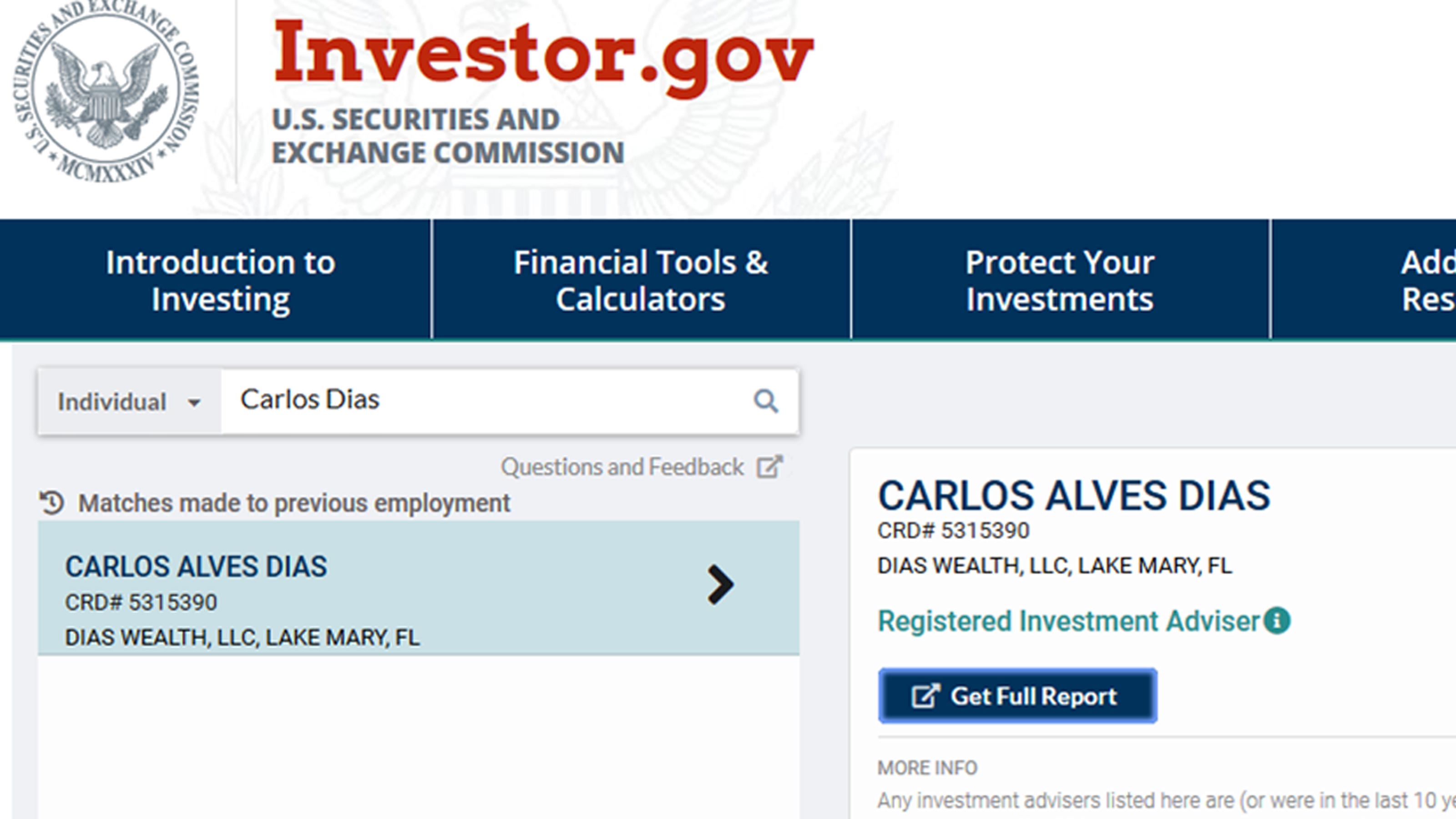Check Your Financial Adviser Now (and Every Year) or Regret It Later
Fewer than 10% of investors use such free background checks as Investor.gov, BrokerCheck or IAPD to check their financial advisers’ backgrounds. These online tools are easy to use and full of important information, so get clicking.


Profit and prosper with the best of Kiplinger's advice on investing, taxes, retirement, personal finance and much more. Delivered daily. Enter your email in the box and click Sign Me Up.
You are now subscribed
Your newsletter sign-up was successful
Want to add more newsletters?

Delivered daily
Kiplinger Today
Profit and prosper with the best of Kiplinger's advice on investing, taxes, retirement, personal finance and much more delivered daily. Smart money moves start here.

Sent five days a week
Kiplinger A Step Ahead
Get practical help to make better financial decisions in your everyday life, from spending to savings on top deals.

Delivered daily
Kiplinger Closing Bell
Get today's biggest financial and investing headlines delivered to your inbox every day the U.S. stock market is open.

Sent twice a week
Kiplinger Adviser Intel
Financial pros across the country share best practices and fresh tactics to preserve and grow your wealth.

Delivered weekly
Kiplinger Tax Tips
Trim your federal and state tax bills with practical tax-planning and tax-cutting strategies.

Sent twice a week
Kiplinger Retirement Tips
Your twice-a-week guide to planning and enjoying a financially secure and richly rewarding retirement

Sent bimonthly.
Kiplinger Adviser Angle
Insights for advisers, wealth managers and other financial professionals.

Sent twice a week
Kiplinger Investing Weekly
Your twice-a-week roundup of promising stocks, funds, companies and industries you should consider, ones you should avoid, and why.

Sent weekly for six weeks
Kiplinger Invest for Retirement
Your step-by-step six-part series on how to invest for retirement, from devising a successful strategy to exactly which investments to choose.
As I worked with several rookies who took part in this year’s NFL, NBA, MLB and NHL drafts, I noticed the lack of financial literacy in the professional athlete community – especially rookies. It’s insane the trust level they give to agents as well as those in their inner circle.
But it’s not an isolated problem. Financial knowledge across the United States is weak overall, and a December 2019 FINRA Foundation “Investors in the United States” report revealed only a third of respondents are able to answer more than half of the 10 investing quiz questions correctly. In addition, 14% of respondents did not think they paid any investment fees. But the most shocking answer by far was that free investor-related tools – such as BrokerCheck and Investor.gov – are used by fewer than 10% of investors!
It seems that the vast majority of investors are unwilling to do due diligence on their financial advisers, failing to examine the individuals who play such an important role in their financial success or destruction.
From just $107.88 $24.99 for Kiplinger Personal Finance
Become a smarter, better informed investor. Subscribe from just $107.88 $24.99, plus get up to 4 Special Issues

Sign up for Kiplinger’s Free Newsletters
Profit and prosper with the best of expert advice on investing, taxes, retirement, personal finance and more - straight to your e-mail.
Profit and prosper with the best of expert advice - straight to your e-mail.
Due diligence should be done before ever hiring a financial adviser and every year afterward. (Want more information? Sign up for Carlos Dias’ free webinar, Deciphering the Types of Financial Advisors, on Sept. 24 or Oct. 28.) Here’s how investors can get started:
Look at your adviser’s Form ADV for fees and complaints
Form ADV is a document that investment advisers must fill out for regulators. It comes in two parts – Part 2A and 2B – and can be found on the Securities and Exchange Commission (SEC) website Investment Adviser Public Disclosure ( IAPD).
Part 2A is the firm brochure. It discloses the company’s business model, fees and compensation, conflicts of interest, investment philosophy, disciplinary information, incentives received for certain investment products, and other industry affiliations – including whether the firm acts a broker and/or insurance agency. That’s important to know, because if so, they could be held to a lower standard in their dealings with clients.
Part 2B is the financial adviser brochure. It discloses the adviser’s educational background and business experience, disciplinary information, additional compensation, any financial disclosures, including judgments or bankruptcies, and other business activities – including whether the financial adviser is also registered as a broker and/or insurance agent.
This type of information is important, because it will determine how the financial adviser will be paid and potential conflicts of interest if a dispute were to ever come up. I’ve heard awful stories from clients that a financial adviser explained the business model to them one way and they later found out it operated in a totally different way.
Form ADV should be provided by the financial adviser before your initial meeting so you can review it to formulate questions. Keep in mind that documents that can be used as evidence in a lawsuit must be initiated: Courts won’t rely on verbal testimony alone.
Search Investor.gov, BrokerCheck or IAPD for free
Certain websites offer information on a financial adviser’s background – including licenses, complaints or awards that have been filed against them, or other legal issues. This all can be obtained in the comfort of your home in under a minute at no cost.
Comparing all three options, Investor.gov offers a seamless way to find information. All you have to do is input the financial adviser’s or firm’s name, and it will redirect accordingly. You can also go directly to FINRA or SEC through BrokerCheck or IAPD.

Verify your financial adviser’s background at least every year as a lot can change. A 2019 Public Investors Arbitration Bar Association (PIABA) Foundation report showed substantial customer complaints along with abusive and fraudulent conduct getting deleted – or “expunged” – forever due to loopholes and manipulation in FINRA.
When reading through your adviser’s report online, keep an eye out for how they are registered:
- Broker-dealers or registered representatives of a brokerage firm are licensed and regulated by the FINRA through a suitability standard. That means while investments can often be deemed suitable, they are not always in your best interest.
- Investment advisers, on the other hand, are regulated by the SEC through a fiduciary standard. With this, the financial adviser has a legal obligation to put your best interests first and foremost.
- Dual advisers, or hybrid advisers, are licensed and regulated by both FINRA and the SEC and as such are covered by both the suitability and fiduciary standards. It’s impossible to know in what capacity they’re acting at all times due to the apparent conflicts of interest and licensing.
Realize that credentials can be overused and misrepresented
As of June 2020, there were 214 professional designations listed on the FINRA website and a dedicated section titled “Professional Designations” to assist with your due diligence. Even financial industry experts have a difficult time distinguishing all of them and which ones are really credible.
Professional designations – including Certified Public Accountant (CPA), Chartered Financial Analyst (CFA) and Certified Financial Planner (CFP) – are the most prestigious, but all designations are not created equal. The SEC has even issued a warning on their website, “Investor Alert: Beware of False or Exaggerated Credentials.” Not all the designations involve the same level of expertise.
Typically, the CFA is for portfolio managers who are involved with the day-to-day operations of overseeing investments, while the CFP is geared toward planning. But just because a financial adviser has a CFP designation, it doesn’t automatically make them better, although they’ve gone through the process of passing an exam. In fact, an Aite Group study titled “Building a Wealth Management Practice: Measuring CFP Professionals' Contribution” even showed that complaints aren’t minimized due to the financial adviser having the designation. On the contrary, it has verified what I’ve been saying for years – the CFP designation is blatantly overused by brokers in order to sell you investments that may not be in your best interest.
Never blindly trust a financial adviser without first doing your own research and looking at the proper disclosure documents. If you feel awkward asking, and they’re not revealing everything to make an informed decision, never hire them as your financial adviser!
Profit and prosper with the best of Kiplinger's advice on investing, taxes, retirement, personal finance and much more. Delivered daily. Enter your email in the box and click Sign Me Up.

Carlos Dias Jr. is a financial adviser, public speaker and president of Dias Wealth, LLC, headquartered in the Orlando, Fla., area, but working with clients nationwide. His expertise spans a diverse clientele, including business owners, retirees, lottery winners and professional athletes with wealth management, tax planning, estate planning, long-term care, annuities and life insurance. Carlos has contributed to Kiplinger, Forbes and MarketWatch, and his work has been featured in CNN, CNBC, The Wall Street Journal, U.S. News & World Report, USA Today and other publications. He’s spoken at various CPA societies across the United States, and Carlos’ presentations often focus on innovative tax strategies, retirement planning and asset protection, providing valuable knowledge to accountants, attorneys and financial professionals.
-
 Nasdaq Leads a Rocky Risk-On Rally: Stock Market Today
Nasdaq Leads a Rocky Risk-On Rally: Stock Market TodayAnother worrying bout of late-session weakness couldn't take down the main equity indexes on Wednesday.
-
 Quiz: Do You Know How to Avoid the "Medigap Trap?"
Quiz: Do You Know How to Avoid the "Medigap Trap?"Quiz Test your basic knowledge of the "Medigap Trap" in our quick quiz.
-
 5 Top Tax-Efficient Mutual Funds for Smarter Investing
5 Top Tax-Efficient Mutual Funds for Smarter InvestingMutual funds are many things, but "tax-friendly" usually isn't one of them. These are the exceptions.
-
 Social Security Break-Even Math Is Helpful, But Don't Let It Dictate When You'll File
Social Security Break-Even Math Is Helpful, But Don't Let It Dictate When You'll FileYour Social Security break-even age tells you how long you'd need to live for delaying to pay off, but shouldn't be the sole basis for deciding when to claim.
-
 I'm an Opportunity Zone Pro: This Is How to Deliver Roth-Like Tax-Free Growth (Without Contribution Limits)
I'm an Opportunity Zone Pro: This Is How to Deliver Roth-Like Tax-Free Growth (Without Contribution Limits)Investors who combine Roth IRAs, the gold standard of tax-free savings, with qualified opportunity funds could enjoy decades of tax-free growth.
-
 One of the Most Powerful Wealth-Building Moves a Woman Can Make: A Midcareer Pivot
One of the Most Powerful Wealth-Building Moves a Woman Can Make: A Midcareer PivotIf it feels like you can't sustain what you're doing for the next 20 years, it's time for an honest look at what's draining you and what energizes you.
-
 I'm a Wealth Adviser Obsessed With Mahjong: Here Are 8 Ways It Can Teach Us How to Manage Our Money
I'm a Wealth Adviser Obsessed With Mahjong: Here Are 8 Ways It Can Teach Us How to Manage Our MoneyThis increasingly popular Chinese game can teach us not only how to help manage our money but also how important it is to connect with other people.
-
 Looking for a Financial Book That Won't Put Your Young Adult to Sleep? This One Makes 'Cents'
Looking for a Financial Book That Won't Put Your Young Adult to Sleep? This One Makes 'Cents'"Wealth Your Way" by Cosmo DeStefano offers a highly accessible guide for young adults and their parents on building wealth through simple, consistent habits.
-
 Global Uncertainty Has Investors Running Scared: This Is How Advisers Can Reassure Them
Global Uncertainty Has Investors Running Scared: This Is How Advisers Can Reassure ThemHow can advisers reassure clients nervous about their plans in an increasingly complex and rapidly changing world? This conversational framework provides the key.
-
 I'm a Real Estate Investing Pro: This Is How to Use 1031 Exchanges to Scale Up Your Real Estate Empire
I'm a Real Estate Investing Pro: This Is How to Use 1031 Exchanges to Scale Up Your Real Estate EmpireSmall rental properties can be excellent investments, but you can use 1031 exchanges to transition to commercial real estate for bigger wealth-building.
-
 Should You Jump on the Roth Conversion Bandwagon? A Financial Adviser Weighs In
Should You Jump on the Roth Conversion Bandwagon? A Financial Adviser Weighs InRoth conversions are all the rage, but what works well for one household can cause financial strain for another. This is what you should consider before moving ahead.